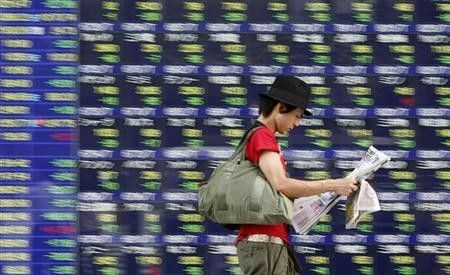Weekly Roundup: Asian Stocks Slide On Greece Concerns, Weak China Data

Asian markets fell at week's end as Greece's inability to form a government, uninspiring Chinese industrial output growth and JPMorgan's trading losses affected investor sentiment.
Japan's Nikkei Stock Average dropped 0.63 percent or 56.34 points to touch 8,953.31 for the sixth straight week of losses. It has lost almost all of the gains it made since February after the Bank of Japan announced an easing of its monetary policy.
South Korea's KOSPI fell 1.43 percent, or 27.80 points, to 1,917.13, its lowest closing in three months. It has gone down 3.6 percent in the week, making it the worst-performing week for the index this year.
Market sentiment was negative after both the conservative New Democracy (ND) party and the Coalition of the Radical Left (Syriza) failed to form a coalition government in Greece. Each party took turns trying to form a coalition government, and both gave up. The socialist Pasok party, which came in third in the elections, had been given three days to try to form a government, with Saturday as its final day.
According to Reuters, on Saturday morning, Socialist leader Evangelos Venizelos met President Karolos Papoulias in the presidential mansion to formally confirm he had been unable to persuade other parties to form a broad coalition that would keep the bailout agreement but try to improve its terms. As a result, another general election may be held in June.
In such a scenario, a caretaker government will be put in place in the country. The temporary government may be able to pass one or two measures, such as the sanctioning of a principal payment on a European Central Bank-held government bond which matures May 18. However, Reuters reported that Greece's political landscape is in disarray after voters humiliated the only parties backing a rescue plan tied to spending cuts, leaving no bloc with sufficient seats to form a government to secure the next tranche of financial aid. ... Without aid from the EU and IMF, the country risks bankruptcy in weeks and -- as European leaders now openly acknowledge -- potential ejection from the euro zone.
Meanwhile, Hong Kong's Hang Seng lost 1.3 percent, or 262.65 points, to close 1,9964.63, which is its lowest level in nearly four months. It plunged 5.3 percent in the entire week. Companies that are doing business in Europe fell as there was no good news from Greece.
To add to the woes, the Greek finance ministry has indicated that it might run out of money by the end of June if the country receives no further bail-out payments. Even if a new pro-bailout government is in office by mid-June, further loan payments may not be released until July or beyond.
The New Democracy and Pasok parties will try to turn a second general election into a vote on Greece's future in the euro zone. If they win the elections and gain concessions from the troika, they might be able to push ahead with the necessary reforms in the short term and persuade the troika to provide Greece with further loan disbursements.
If the Syriza forms a coalition government, it is likely to reverse some of the recent structural reforms, suspend debt payments and effectively bring an end to the existing bailout deal.
One possible scenario is that euro zone policymakers could withdraw the rescue package and refuse to provide emergency loans for the Greek banks until Greece adheres to the bailout terms. Greece would then face devastating bank runs, prompting the collapse of its banking system and an exit from the euro zone.
Another factor that dragged down Asian market sentiment was the report that China's industrial output growth slowed in April. According to the National Bureau of Statistics, industrial production in China rose 9.3 percent in April from a year earlier, down from 11.9 percent increase in March.
Meanwhile, China's inflation rate slowed in April from a year earlier to 3.4 percent, down from 3.6 percent in March. The diminishing inflation should be good news for the market because it can help the Chinese government invigorate growth without much concern about rising prices.
Also raising investors' concerns was the report from JPMorgan Chase & Co, which said that it had $2 billion in losses on derivatives meant to hedge its credit risk. JPMorgan, which is the largest bank in the U.S., is facing the losses its hedging strategy failed.
Investors fear that the report from JPMorgan is a sign of larger problems. The news from the financial institution -- a company perceived to have excellent risk management strategy -- is expected to become clearer next week, a development that could further affect the markets.
India's BSE Sensex declined by 127 points on Friday, its fourth consecutive day of losses, with a total weekly loss of 3.2 percent. In addition to the global concerns,the Indian market was affected by a 3.5 percent fall in industrial production in March from a year earlier, which raised worries that the country's growth is declining.
© Copyright IBTimes 2024. All rights reserved.




















